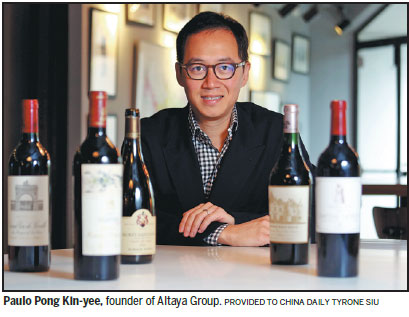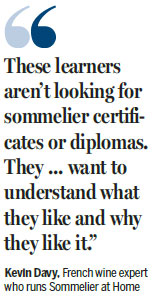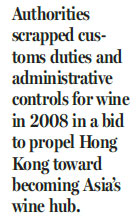Hong Kong's Wine Buffs Drinking In High-end Vintages
Cross-border trade
This smart-drinking attitude in Hong Kong's wine scene is also trickling across the border and seeping into the soil of the Chinese mainland.
Davy is in great demand among mainland wine buffs. In recent years, he's been invited by businesses in Beijing, Shanghai and Hangzhou, Zhejiang province, to provide wine-tasting workshops for their staff members.
"These learners aren't looking for sommelier certificates or diplomas," he said. "They come to me simply as wine lovers who want to understand what they like and why they like it, so they can buy the right affordable wines that match their own tastes and values."
With demand for mid-range wines growing, the mainland is forecast to overtake the United Kingdom and France by 2020 to become the world's second-biggest consumer after the United States. Wine consumption on the mainland is projected to soar to nearly $22 billion by 2020, up 40 percent from $15.5 billion last year, according to estimates from International Wine & Spirits Research.
The rising volume represents a real and growing appetite for the beverage among mainland drinkers, notwithstanding the rising trend of wine being bought as business gifts amid the government's clampdown on corruption.
Though the majority of mainland drinkers are less wine-savvy than those in Hong Kong, "they are more eager to learn, and they tend to learn faster", Davy said.
According to Song Haiyan, associate dean of the School of Hotel and Tourism Management at the Hong Kong Polytechnic University who oversees a nascent program called Master of Science in International Wine Management, the mainland's rising appetite for quality wines has been driven by a growing middle class, most of whom are millennials who rarely pennypinch on lifestyle goods.
Relatively speaking, these mainland millennials are fussier than Generation X. They're better adapted to global wine trends, and, unlike their parents' generation, aren't content with mediocre wines, he said.
Surprise vintages
In addition to providing courses about basic wine knowledge and drinking etiquette, Davy also offers a personalized sommelier service. His duties include bringing in superb bottles from famous vineyards that will complement the food his clients prepare at home.
He said he is astonished at how wine-savvy his clients are. "Many wine enthusiasts in Hong Kong are accustomed to the taste of high-priced wines," he said. "They always ask me to surprise them with bottles that are underrated, but taste divine."
Last year, nearly 63 million liters of wine poured into Hong Kong, amounting to HK$12 billion ($1.5 billion), far outstripping the HK$1.62 billion imported in 2007.
Most of the wine Hong Kong imports comes from France. In March, French wines accounted for 62.4 percent of the city's wine imports, and were valued at HK$619 million. Australia took second place, earning HK$181 million, with about 18 percent of the market.
Hong Kong's wine exports have also been expanding exponentially. Since the authorities scrapped customs duties and administrative controls for wine in 2008 in a bid to propel Hong Kong toward becoming Asia's wine hub, the city has pulled in sizable profits, mostly through re-exporting bottles to the Chinese mainland. Re-exporting involves exporting previously imported goods in an untouched state.
Cross-border wine trade leads the market. In March, figures calculated by the city's Commerce and Economic Development Bureau showed that Hong Kong pocketed around HK$355 million through re-exports of wine to the mainland. That was equivalent to 76.5 percent of the city's total wine re-export receipts for the month. Destinations such as Macao, (13 percent) and Vietnam (6 percent) came next.
The close ties in the cross-border wine trade are the result of years of cooperation between the Hong Kong authorities and the central government.
In the past decade, a number of incentives have been introduced to facilitate the cross-border wine trade for industry players, including the reduction of red tape for re-exports to mainland ports, and zero-tariff status for Hong Kong-produced wines entering the mainland under the Closer Economic Partnership Arrangement.

























